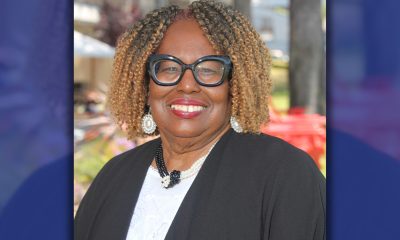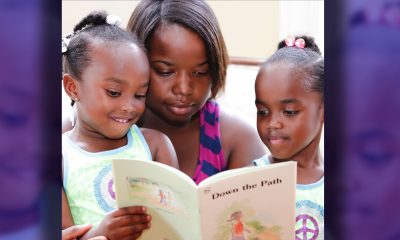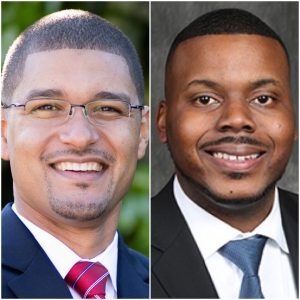Advice
Have Too Many Bad Habits? Here Are 6 Ways To Create Good Ones
PASADENA JOURNAL — It’s said that we become our habits. In some cases that is not a good thing; bad habits prevail among many Americans. One report found that over 70 percent of US adults have at least one unhealthy behavior associated with chronic health problems. Breaking bad habits isn’t easy, but sometimes the best answer is replacing them with empowering new habits that bring positive changes to one’s daily life.
By Journal Staff
It’s said that we become our habits. In some cases that is not a good thing; bad habits prevail among many Americans. One report found that over 70 percent of US adults have at least one unhealthy behavior associated with chronic health problems.
Breaking bad habits isn’t easy, but sometimes the best answer is replacing them with empowering new habits that bring positive changes to one’s daily life.
“We often have habits that hold us back, like smoking or eating food lacking in nutrition,” says Dr. Rob Carter III, co-author with his wife, Dr. Kirti Salwe Carter, of The Morning Mind: Use Your Brain to Master Your Day and Supercharge Your Life (www.themorningmind.com).
“A great way to start every day is with a series of empowering habits. Morning, in fact, according to some researchers is the best time to start making these kinds of changes in your life.”
Carter has six ways you can create new, empowering habits and make them stick:
- Prioritize habits. “For each area in which you want to grow,” Carter says, “take some time to think about what kind of empowering habits you’d like to establish around that topic.”
Areas to consider are health, wealth, social, relationships, job, hobbies, self-esteem, interpersonal skills, positive thinking, time management, and life purpose. - Focus on one at a time. “Because we have a limited amount of willpower in the morning, it’s very important how we use that energy,” Carter says. “By focusing on just one habit you would like to change – for example, eating a healthy breakfast – you can concentrate that willpower on the task at hand until it becomes a habit.”
- Be reasonable with yourself. The time it will take to establish the new habit depends upon how much resistance a person has. And sometimes developing a new habit represents a long leap from where one currently stands. “That’s too daunting,” Carter says, “so break it down into more achievable steps. Incremental improvements add up to a big transformation and are often more powerful and sustainable.”
- Commit specific time toward the goal. Carter suggests nailing down a detailed timeline and committing a full effort toward formation of the new habit within that time span. “Write down what you hope to achieve, how many times a week you will practice the new habit, and when and where you’ll do it,” Carter says. “Having a specific goal helps keep you accountable to yourself.
- Reward success. Have a reward in place to celebrate performing your new habit. “It has to be something that will motivate you to complete your habit,” Carter says.
- Stack habits. “The neural pathways of your pre-existing habits are well-travelled routes in your brain,” Carter says. “You can take advantage of this by building a new habit and associating it with an old one that is well-established. This is a quicker way to create new habits than if you were to start from scratch. For example, if you want to create a new habit of exercising in the morning, and you have a habit of reading the newspaper every morning, tie these activities together by exercising immediately before you read the paper. Reading the paper becomes your reward.”
“When you learn for yourself how simple it is to change habits,” Carter says, “you’ll want to make adjustments to all areas of your life.”
[Dr. Rob Carter III and Dr. Kirti Salwe Carter are co-authors of The Morning Mind: Use Your Brain to Master Your Day and Supercharge Your Life (www.themorningmind.com).]
Activism
Life After Domestic Violence: What My Work With Black Women Survivors Has Taught Me
Survivors sometimes lack awareness about the dynamics of healthy relationships, particularly when one has not been modeled for them at home. Media often minimizes domestic abuse, pushing the imagery of loyalty and love for one’s partner above everything — even harm.
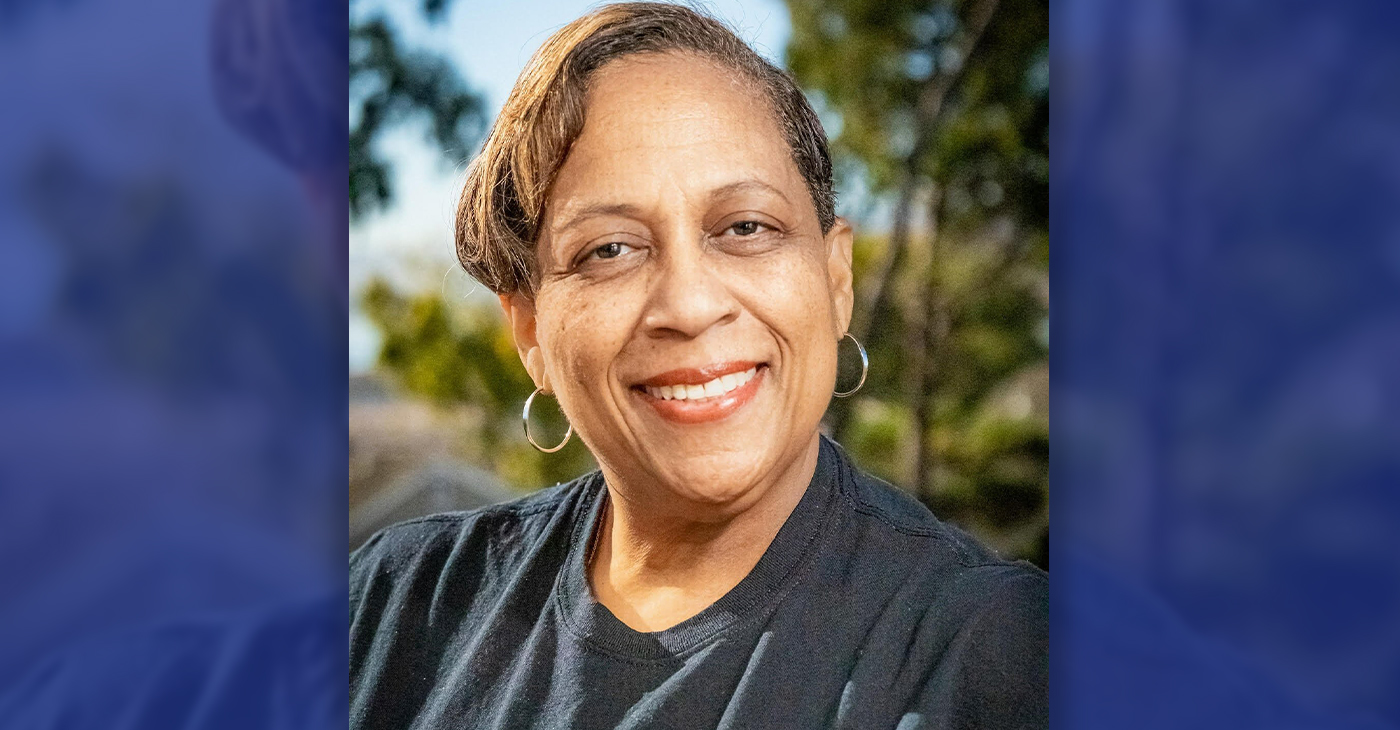
By Paméla Michelle Tate, Ph.D., California Black Media Partners
It was the Monday morning after her husband had a “situation” involving their child, resulting in food flying in the kitchen and a broken plate.
Before that incident, tensions had been escalating, and after years of unhappiness, she finally garnered enough courage to go to the courthouse to file for a divorce.
She was sent to an on-site workshop, and the process seemed to be going well until the facilitator asked, “Have you experienced domestic abuse?” She quickly replied, “No, my husband has never hit me.”
The facilitator continued the questionnaire and asked, “Has your husband been emotionally abusive, sexually abusive, financially abusive, technologically abusive, or spiritually abusive?”
She thought about how he would thwart her plans to spend time with family and friends, the arguments, and the many years she held her tongue. She reflected on her lack of access to “their money,” him snooping in her purse, checking her social media, computer, and emails, and the angry blowups where physical threats were made against both her and their children.
At that moment, she realized she had been in a long-suffering domestic abuse relationship.
After reading this, you might not consider the relationship described above as abusive — or you might read her account and wonder, “How didn’t she know that she was in an abusive relationship?”
Survivors sometimes lack awareness about the dynamics of healthy relationships, particularly when one has not been modeled for them at home. Media often minimizes domestic abuse, pushing the imagery of loyalty and love for one’s partner above everything — even harm.
After working with survivors at Black Women Revolt Against Domestic Violence in San Francisco, California, I have learned a great deal from a variety of survivors. Here are some insights:
Abuse thrives in isolation.
Societal tolerance of abusive behavior is prevalent in the media, workplaces, and even churches, although there are societal rules about the dos and don’ts in relationships.
Survivors are groomed into isolation.
Survivors are emotionally abused and manipulated almost from the beginning of their relationships through love-bombing. They are encouraged or coerced into their own little “love nest,” isolating them from family and friends.
People who harm can be charismatic and fun.
Those outside the relationship often struggle to believe the abuser would harm their partner until they witness or experience the abusive behavior firsthand.
Survivors fear judgment.
Survivors fear being judged by family, friends, peers, and coworkers and are afraid to speak out.
Survivors often still love their partners.
This is not Stockholm Syndrome; it’s love. Survivors remember the good times and don’t want to see their partner jailed; they simply want the abuse to stop.
The financial toll of abuse is devastating.
According to the Allstate Foundation’s study, 74% of survivors cite lack of money as the main reason for staying in abusive relationships. Financial abuse often prevents survivors from renting a place to stay. Compounding this issue is the lack of availability of domestic abuse shelters.
The main thing I have learned from this work is that survivors are resilient and the true experts of their own stories and their paths to healing. So, when you encounter a survivor, please take a moment to acknowledge their journey to healing and applaud their strength and progress.
About the Author
Paméla Michelle Tate, Ph.D., is executive director of Black Women Revolt Against Domestic Violence in San Francisco.
Activism
A Student-Run Group Is Providing Critical Support Services to Underserved Residents
During his three years volunteering at the program, Resource Director Zain Shabbir, says he noticed that many of the people who come in do not know how to navigate social services support systems, particularly online. This knowledge deficit, Shabbir says, is due to age or limited exposure to technology.
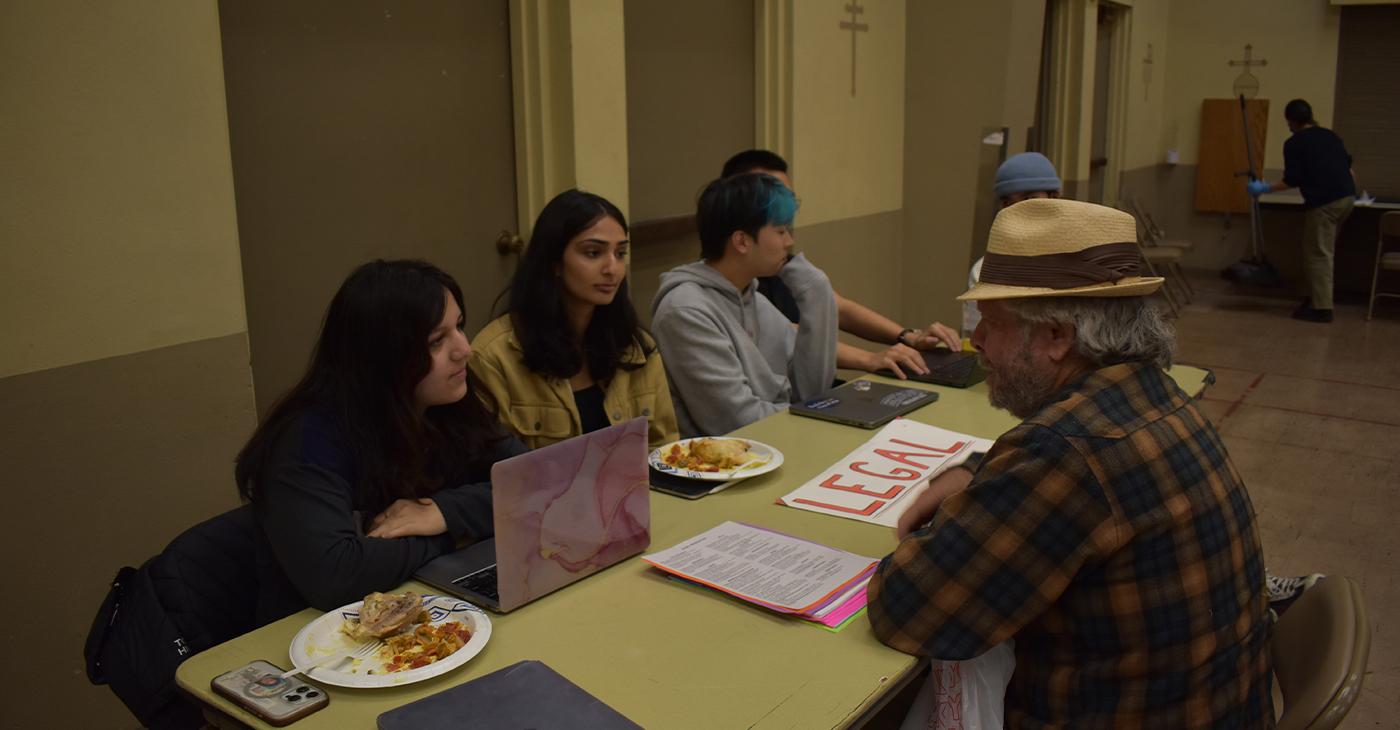
Part 2
By Magaly Muñoz
Resource Director Zain Shabbir is a jack-of-all-trades at the Suitcase Clinic, a student-run resource center that provides health and other services to underserved residents of Berkeley and surrounding areas.
Shabbir was once a clinic director. Now, he manages the General Clinic, floating around when case managers need assistance. And he has big plans for a new initiative.
During his three years volunteering at the program, Shabbir says he noticed that many of the people who come in do not know how to navigate social services support systems, particularly online. This knowledge deficit, Shabbir says, is due to age or limited exposure to technology.
So, he teaches clients the basics of using email, writing in word documents, and backing up files to their phones.
Shabbir shared a story about an interaction he had with a woman who came in seeking help to create a template to message property owners and realtors as she was seeking housing. Until that point, the woman was composing separate messages to each listing she was interested in, and that process was taking up too much of her time. With Shabbir’s help, she created a standard template she could modify and use for each housing inquiry or application.
He’s also hoping to use the technology to help people create resumes to find jobs.
“[The intent] is to help people find work in the city or wherever they live — or help them find housing. As most are probably aware, the two really go together because for housing, you need income verification, and for a job you need housing,” Shabbir said.
Having a warm place to go and a hot meal may seem basic buy it is critical for people who are struggling, clinic leaders say.
Mark, a frequent attendee of the Tuesday clinic, told the Oakland Post that he’s been receiving services from the program for nearly 25 years.
Mark said he was able to receive a referral to dental care through the Clinic, which he’s been using for about 20 years now. He also utilized the chiropractor, a service that is no longer offered, for pain and aches he acquired over the years.
Many program participants say they visit the clinic now for services provided by Berkeley medical students, who rely on osteopathic care rather than traditional methods. Osteopathic medicine is a medical philosophy and practice that focuses on the whole person, rather than just symptoms.
Executive director Nilo Golchini said that many clinic patients tend to appreciate and trust this type of medicine over mainstream practices because of sub-standard care they have received in the past because they are homeless or poor.
Acupuncture is also an extremely popular station at the Clinic as well, with participants saying it “soothes and calms” them.
Attendees of the clinic are generally in happy spirits throughout the hours they’re able to interact with fellow residents. Some even participate in arts and crafts, moving from table to show their friends their new creations.
“It’s a program that’s going strong,” said Golchini. “There’s a space for everyone” who wants to volunteer or receive services, and they’ll keep going as long as the community needs it.
The Suitcase General Clinic is open every Tuesday from 6:30 to 9:30pm. Women’s and Youth Clinics are held every Monday from 6 to 9pm.
Activism
2024 in Review: Seven Questions for Frontline Doulas
California Black Media (CBM) spoke with Frontline Doulas’ co-founder Khefri Riley. She reflected on Frontline’s accomplishments this year and the organization’s goals moving forward.
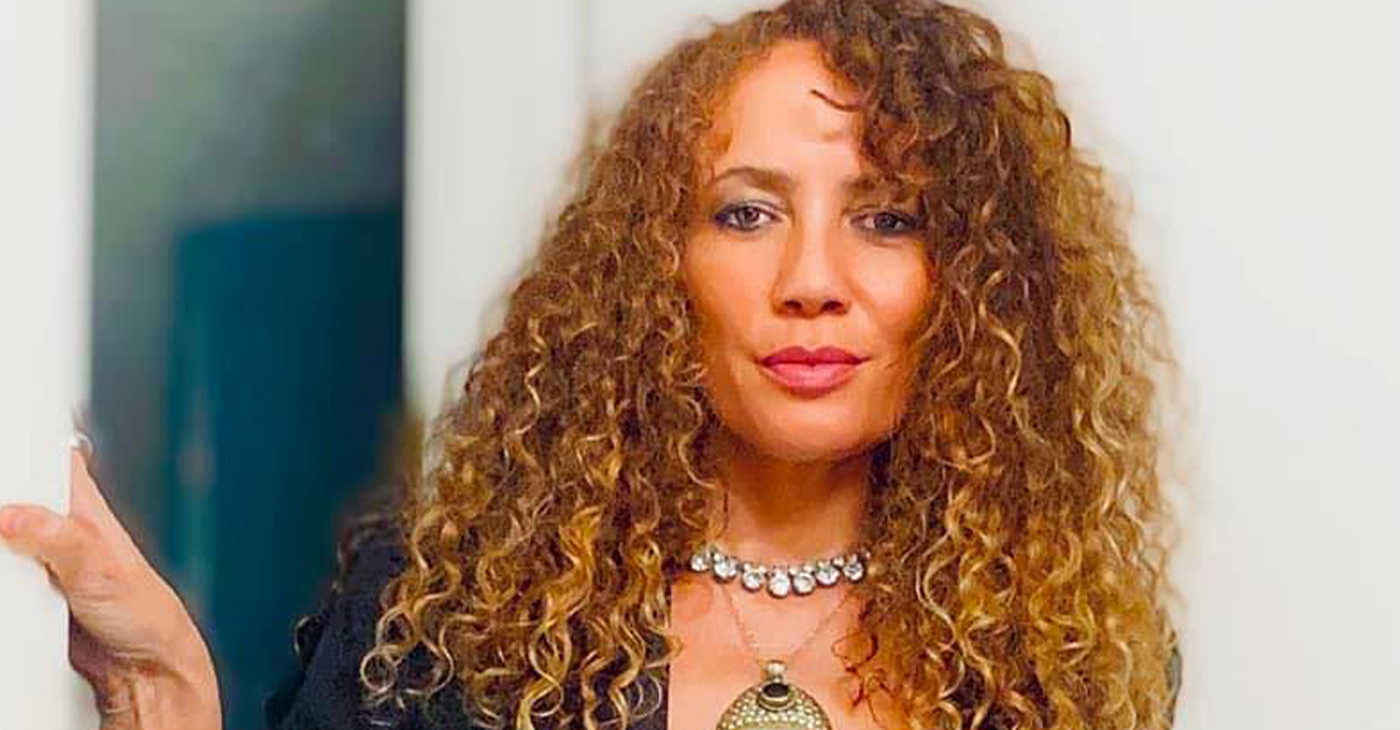
By Edward Henderson, California Black Media
Frontline Doulas provides African American families non-medical professional perinatal services at no cost.
This includes physical, emotional, informational, psychosocial and advocacy support during the pregnancy, childbirth and postpartum period. Women of all ages — with all forms of insurance — are accepted and encouraged to apply for services.
California Black Media (CBM) spoke with co-founder Khefri Riley. She reflected on Frontline’s accomplishments this year and the organization’s goals moving forward.
Responses have been edited for clarity and length.
Looking back at 2024, what stands out to you as your most important achievement and why?
In 2024, we are humbled to have been awarded the contract for the Los Angeles County Medical Doula Hub, which means that we are charged with creating a hub of connectivity and support for generating training and helping to create the new doula workforce for the medical doula benefit that went live in California on Jan. 1, 2023.
How did your leadership and investments contribute to improving the lives of Black Californians?
We believe that the revolution begins in the womb. What we mean by that is we have the potential and the ability to create intentional generational healing from the moment before a child was conceived, when a child was conceived, during this gestational time, and when a child is born.
And there’s a traditional saying in Indigenous communities that what we do now affects future generations going forward. So, the work that we do with birthing families, in particular Black birthing families, is to create powerful and healthy outcomes for the new generation so that we don’t have to replicate pain, fear, discrimination, or racism.
What frustrated you the most over the last year?
Working in reproductive justice often creates a heavy burden on the organization and the caregivers who deliver the services most needed to the communities. So, oftentimes, we’re advocating for those whose voices are silenced and erased, and you really have to be a warrior to stand strong and firm.
What inspired you the most over the last year?
My great-grandmother. My father was his grandmother’s midwife assistant when he was a young boy. I grew up with their medicine stories — the ways that they healed the community and were present to the community, even amidst Jim Crow.
What is one lesson you learned in 2024 that will inform your decision-making next year?
I find that you have to reach for your highest vision, and you have to stand firm in your value. You have to raise your voice, speak up and demand, and know your intrinsic value.
In a word, what is the biggest challenge Black Californians face?
Amplification. We cannot allow our voices to be silent.
What is the goal you want to achieve most in 2025?
I really would like to see a reduction in infant mortality and maternal mortality within our communities and witness this new birth worker force be supported and integrated into systems. So, that way, we fulfill our goal of healthy, unlimited birth in the Black community and indeed in all birthing communities in Los Angeles and California.
-

 Activism4 weeks ago
Activism4 weeks agoOakland Post Endorses Barbara Lee
-

 Activism4 weeks ago
Activism4 weeks agoOakland Post: Week of March 28 – April 1, 2025
-

 Activism3 weeks ago
Activism3 weeks agoOakland Post: Week of April 2 – 8, 2025
-

 #NNPA BlackPress3 weeks ago
#NNPA BlackPress3 weeks agoTrump Profits, Black America Pays the Price
-

 Activism2 weeks ago
Activism2 weeks agoOakland Post: Week of April 9 – 15, 2025
-

 #NNPA BlackPress3 weeks ago
#NNPA BlackPress3 weeks agoHarriet Tubman Scrubbed; DEI Dismantled
-

 #NNPA BlackPress3 weeks ago
#NNPA BlackPress3 weeks agoTrump Targets a Slavery Removal from the National Museum of African-American History and Culture
-

 #NNPA BlackPress3 weeks ago
#NNPA BlackPress3 weeks agoLawmakers Greenlight Reparations Study for Descendants of Enslaved Marylanders




